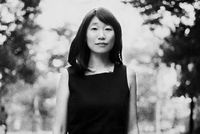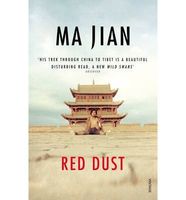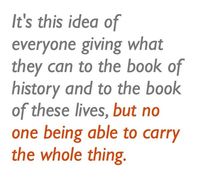Madeleine Thien on Language, Music, and Asking the Unaskable
2016 has been Madeleine Thien's year. It's not often that the world of writing and publishing can agree so enthusiastically on a writer's achievements, but Thien's breathtaking Do Not Say We Have Nothing (Knopf Canada), which tells the story of Chinese musicians persecuted for their dedication to Western music and the multi-generational fallout of their experiences, has achieved the unique distinction of truly universal acclaim. That acclaim translated into a whirlwind prize season for Thien, with the book winning the Scotiabank Giller Prize and the Governor General's Literary Award for Fiction, and being shortlisted for the UK-based Man Booker Prize.
We had the chance to discuss Do Not Say We Have Nothing in depth with Thien, from why she chose to tell the musicians' story through one of their daughters to how her musical structure reflects her themes.
She talks to us about the limits of language when it comes to expression, about the questions we can't and don't ask ourselves in life and in writing, and she shares her advice for emerging writers.
Grace O'Connell for Open Book:
Why did you want to tell Kai and Zhuli and Sparrow's story through Marie? How did she evolve for you and what made her such an effective lens for her family's story?
Madeleine Thien:
It's interesting because she is in some ways very marginal to the story, she's a couple steps outside. I had this idea of the person who is the keeper of the records and I was thinking about this person who smuggled these documents out of China after 1989, someone who was very central in the government and somehow managed to get a cache of documents that were related to the 1989 demonstration and that person was only known as "The Compiler".
So I was thinking about this person, who the vehicle for history, or documents, or information, or narrative of some form, and the kind of role they play in accumulating all the messy bits and pieces of history.
GO:
Is that role, keeper of the narrative and the records, something you relate to, as a writer?
MT:
(Laughs) Yes, probably. I think it's common to both this novel and my previous one, Dogs at the Perimeter, because the narrator there is also putting together these fragments.
I think it's an interesting intimacy with Marie, because she is telling the story as a daughter, so there is an intimacy to how she is trying to understand her father's life and death. And at the same time, her way of understanding him is to understand the people who he loved, and in that way, shed light on who her father was and could have been and wanted to be.
GO:
Structurally and thematically, Do Not Say We Have Nothing deals with beginnings and endings, whether it's lives, generations, movements in music, chapters, and you have your interesting structure that is circular and musical going on, so I wanted to talk to you about how you view the theme of beginnings and endings in the novel.
Your CanLit News
Subscribe to Open Book’s newsletter to get local book events, literary content, writing tips, and more in your inbox
MT:
That's a great question, nobody has asked me that.
There's a line that I've always remembered from a book called Red Dust, it's by a Chinese writer named Ma Jian, and he has this line, and I'll paraphrase, but he basically writes "He wanted to leave Beijing and forge his own path, but he realizes that we all try to cross each other's beginnings and ends".
And I think that structure is very much part of this book, it's the beginnings and endings, and the unfinished-ness of another life that becomes our beginning. And how what we might have to set down partway through our lives might then be picked up by someone else. It's this idea of everyone giving what they can to the book of history and to the book of these lives, but no one being able to carry the whole thing.
GO:
Wow, that's gorgeous. I wanted to talk as well about the characters from the conservatory, who have dedicated their lives to their music and are persecuted for it. As a writer, what was it like, emotionally, to write that kind of attack on artistic lives?
MT:
That's a hard question. I think that for the musicians, especially Sparrow and Zhuli, they've devoted themselves to this art form that is abstract and has multiple meanings, multiple ways of expression, and many dissonances – there's a lot about counterpoint and harmony, but there's also a lot about dissonance. And they don't want to speak in a simpler way, and so part of the rupture that happens to them, the breakage that happens to them and their relationship with the art, is not being willing to speak in the language of the time, or not knowing how to separate themselves so that their public self can speak in the language of the time but their private selves can still exist and flourish. And I think Zhuli just sees the rupture right away and I think Sparrow keeps trying to see some way that some part of him can be silent – he's trying to figure out how much of him can be compromised, or if he can't be compromised at all, before the thing that he's protecting will become of no value whatsoever.
They're big themes, it's a big revolutionary question, about art – art for the people, speaking the masses, accessibility, complexity, all of those things. But I think in this novel, it's so much about the private sphere, of what that art makes available to them – or doesn't.
GO:
That's fascinating, and I imagine it must have been a very intense writing process.
MT:
Yes, it makes you value what you think you're giving to art and what art is giving to you. It's a book that made me ask a lot of questions. I've been thinking a lot about the unasked questions. For so many books, I was looking at unanswerable ones, but more and more I'm wondering about the ones that we just never even begin to ask.
GO:
That's interesting – so the questions we don't ask in books, or of ourselves?
MT:
Both those things, but primarily of ourselves. Because then that will be reflected in the books that we write. There are certain questions that are unaskable or we don't ask.
I don't know; this is still sort of new territory for me. This could be the subject of another book.
GO:
It sounds like you've got enough material for the next five books!
MT:
(Laughs) Yes, it feels that way.
GO:
I suppose this is applicable to the characters in the book as well – do you think that idea of the questions we don't ask ourselves, the not asking, comes from a place of self-protection or more from a place our identity in society, or simply from things that we're unwilling to face?
MT:
I think all of those things, because each of our experiences is a kind of container. So inside that container, we ask a lot of questions, but we don't necessarily have the language ask different kinds of questions, because the language itself is also a container.
So, I think I am thinking about things because so much of Do Not Say is about abstract forms of art, where language and words are not the medium of expression. The knowledge that accumulates through those other art forms is very difficult to express in language. Or language seems to cut it off in some way.
So if there is knowable accrued that is unrelated to language, how do we ask the questions that will allow those ways of thinking to happen?
GO:
That's such an interesting way of looking at it.
MT:
Yes, and maybe even unanswerable in language. We don't really know.
GO:
So, maybe it's a question of the limits of language itself?
MT:
Yes, very much.
GO:
I wanted to shift gears to your experience as a writing teacher; you've taught abroad, you've taught in Canada, so you're guiding emerging writers and many feel it's a tough time in the publishing industry. So, what sort of advice do you find yourself giving to young writers these days?
MT:
That's great, because I just finished teaching a workshop in Banff, so I've been thinking about that a lot. It was the emerging writers intensive, and it was basically a workshop of first chapters, but we really looked at the structure of the books that they were making, very large scale.
One thing that we talked a lot about in workshop was embracing the contradictions in their work, and pursuing those contradictions. Both in the ideas, the characters and the narrative, and in structure of the work. So I guess my advice is that that is actually where the essence and originality of the work is – it's in those contradictions. And that making space for that is the work of the artist and the art.
I didn't answer the more pragmatic questions about publishing, but I still firmly believe that you should put everything into the work; the rest is quite out of our control.
GO:
Well, there's lots of pragmatic advice out there, I think that craft-focused advice is really valuable.
So I would just ask you now what you're up next – are you thinking about future projects, or are you still in the very large machine that is happening around this book, which would be understandable.
MT:
(Laughs) I'm actually thinking a lot about a new work, a new novel, which I haven't had as much time yet to sit down and write, though I hope I'm going to start writing again very soon.
I think the next year is going to be trying to balance the travel, which is going to be very intense, and the space I'd like to have for writing. I'll probably be writing on the road a lot, which I don't mind, I kind of like it.
GO:
Well, we'll all be very excited for that new book when it comes out. I know I will be!
MT:
Thank you!
_________________________________________________________________
Interview transcript has been lightly edited for length and clarity.
_________________________________________________________________
Madeleine Thien is the author of the story collection Simple Recipes, which was a finalist for the Commonwealth Writers’ Prize, a Kiriyama Pacific Prize Notable Book, and won the BC Book Prize for Fiction; the novel Certainty, which won the Amazon.ca First Novel Award; and the novel Dogs at the Perimeter, which was shortlisted for Berlin’s 2014 International Literature Award and won the Frankfurt Book Fair’s 2015 Liberaturpreis. Her most recent novel, Do Not Say We Have Nothing, won the Scotiabank Giller Prize and was shortlisted for the Man Booker Prize. Her novels and stories have been translated into twenty-five languages, and her essays have appeared in Granta, The Guardian, the Financial Times, Five Dials, Brick, and Al Jazeera. Her story “The Wedding Cake” was shortlisted for the prestigious 2015 Sunday Times EFG Short Story Award. The daughter of Malaysian-Chinese immigrants to Canada, she lives in Montreal.







